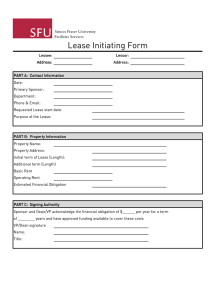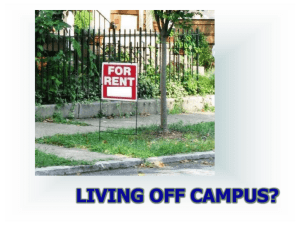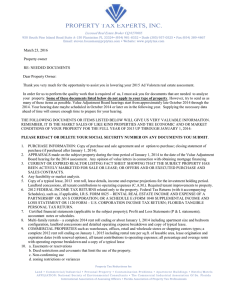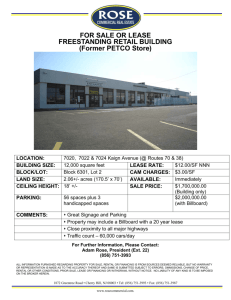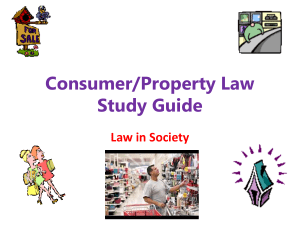Leasing Information The legally binding contract that defines your rights and
advertisement
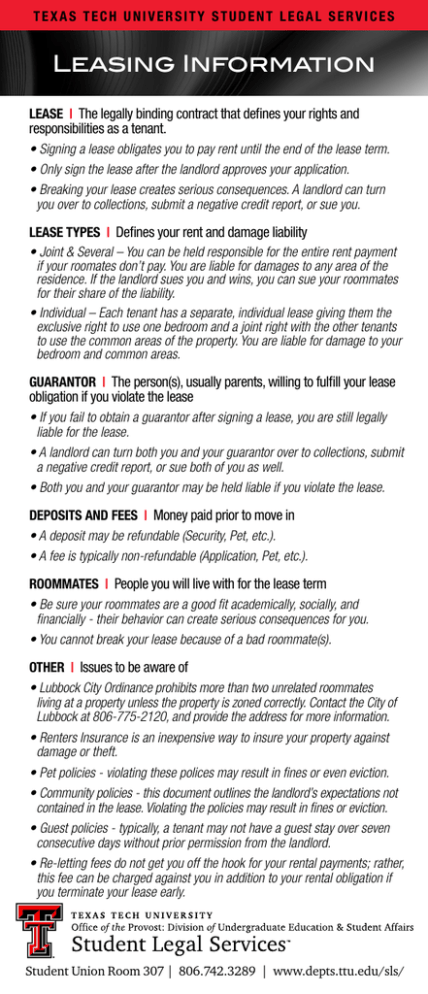
TEXAS TECH UNIVERSITY STUDENT LEGAL SERVICES Leasing Information Lease | The legally binding contract that defines your rights and responsibilities as a tenant. • Signing a lease obligates you to pay rent until the end of the lease term. • Only sign the lease after the landlord approves your application. • Breaking your lease creates serious consequences. A landlord can turn you over to collections, submit a negative credit report, or sue you. Lease Types | Defines your rent and damage liability • Joint & Several – You can be held responsible for the entire rent payment if your roomates don’t pay. You are liable for damages to any area of the residence. If the landlord sues you and wins, you can sue your roommates for their share of the liability. • Individual – Each tenant has a separate, individual lease giving them the exclusive right to use one bedroom and a joint right with the other tenants to use the common areas of the property. You are liable for damage to your bedroom and common areas. Guarantor | The person(s), usually parents, willing to fulfill your lease obligation if you violate the lease • If you fail to obtain a guarantor after signing a lease, you are still legally liable for the lease. • A landlord can turn both you and your guarantor over to collections, submit a negative credit report, or sue both of you as well. • Both you and your guarantor may be held liable if you violate the lease. Deposits and Fees | Money paid prior to move in • A deposit may be refundable (Security, Pet, etc.). • A fee is typically non-refundable (Application, Pet, etc.). Roommates | People you will live with for the lease term • Be sure your roommates are a good fit academically, socially, and financially - their behavior can create serious consequences for you. • You cannot break your lease because of a bad roommate(s). Other | Issues to be aware of • Lubbock City Ordinance prohibits more than two unrelated roommates living at a property unless the property is zoned correctly. Contact the City of Lubbock at 806-775-2120, and provide the address for more information. • Renters Insurance is an inexpensive way to insure your property against damage or theft. • Pet policies - violating these polices may result in fines or even eviction. • Community policies - this document outlines the landlord’s expectations not contained in the lease. Violating the policies may result in fines or eviction. • Guest policies - typically, a tenant may not have a guest stay over seven consecutive days without prior permission from the landlord. • Re-letting fees do not get you off the hook for your rental payments; rather, this fee can be charged against you in addition to your rental obligation if you terminate your lease early. Student Union Room 307 | 806.742.3289 | www.depts.ttu.edu/sls/ TEXAS TECH UNIVERSITY STUDENT LEGAL SERVICES checklists Before | Selecting off-campus housing ❒ Create a budget establishing the rent amount you can afford. ❒ View properties that fit within your budget and consider the following: • Complex location in relation to TTU, shopping, entertainment, etc. • Unit location in relation to covered parking, pool, laundry facilities, etc. • Transportation to and from TTU campus • Utilities – Are they included and what is a typical monthly charge? ❒ View the actual apartment – Internet pictures/model units can be deceiving. ❒ Choose roommates that fit academically, socially, and financially. ❒ Get all verbal agreements and promises in writing. ❒ Have Student Legal Services review the lease prior to signing. Moving In ❒ Complete the move-in inventory/condition form before moving in; walk through and document in writing and take pictures of any damage. ❒ Turn in the move-in inventory/condition form within the landlord’s deadline, typically 24 – 48 hours after move-in; keep a copy for your records. ❒ Set up the required utilities two weeks before moving in. This may include gas, electricity, water, cable, internet, and telephone. ❒ Visit the USPS website to forward mail to your new address. ❒ Get renters insurance to protect yourself from the destruction or theft of your personal property. Living There ❒ Set up a folder to keep any correspondence between you and the landlord; this folder should have a copy of your lease, move-in inventory, pictures, repair requests, letters, e-mails, texts, etc. ❒ Submit repair requests in writing; the landlord is not required to make repairs unless your rent is paid in full. A form is available on the SLS website. ❒ Be a good neighbor. ❒ Take care of the landlord’s apartment and property; this can reduce your damage liability when moving out. Moving Out ❒ Turn in a written move out notice that complies with your lease’s move-out notice; some landlords have their own forms and typically require 30 – 60 days advance notice. A form is available on the SLS website. ❒ Thoroughly clean your apartment; the unit must meet the landlord’s expectation of clean. ❒ Take pictures documenting the unit’s move-out condition to protect yourself from potential charges. ❒ Schedule an inspection/walk through with your landlord. ❒ Turn in your keys and give a written request for the return of your security deposit that contains your forwarding address (the landlord has no obligation to refund until they receive your forwarding address). Student Union Room 307 | 806.742.3289 | www.depts.ttu.edu/sls/
